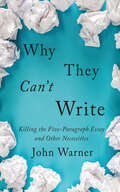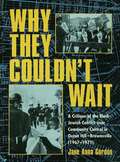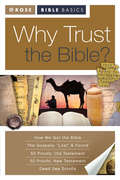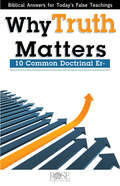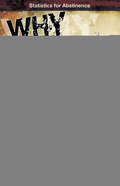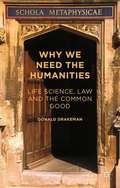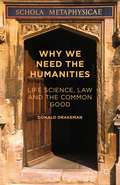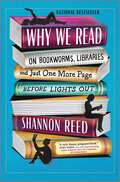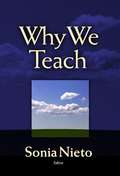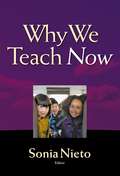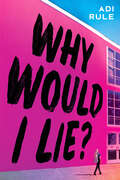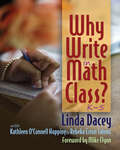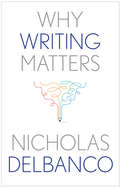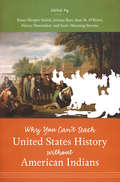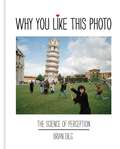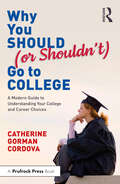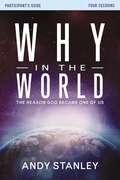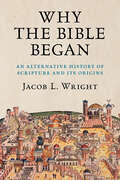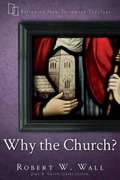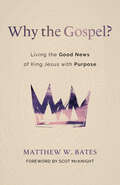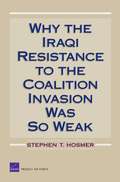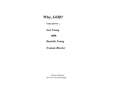- Table View
- List View
Why Theatre Matters
by Kathleen GallagherWhat makes young people care about themselves, others, their communities, and their futures? In Why Theatre Matters, Kathleen Gallagher uses the drama classroom as a window into the daily challenges of marginalized youth in Toronto, Boston, Taipei, and Lucknow. An ethnographic study which mixes quantitative and qualitative methodology in an international multi-site project, Why Theatre Matters ties together the issues of urban and arts education through the lens of student engagement. Gallagher's research presents a framework for understanding student involvement at school in the context of students' families and communities, as well as changing social, political, and economic realities around the world.Taking the reader into the classroom through the voices of the students themselves, Gallagher illustrates how creative expression through theatre can act as a rehearsal space for real, material struggles and for democratic participation. Why Theatre Matters is an invigorating challenge to the myths that surround urban youth and an impressive study of theatre's transformative potential.
Why They Can't Write: Killing the Five-Paragraph Essay and Other Necessities
by John WarnerAn important challenge to what currently masquerades as conventional wisdom regarding the teaching of writing.There seems to be widespread agreement that—when it comes to the writing skills of college students—we are in the midst of a crisis. In Why They Can't Write, John Warner, who taught writing at the college level for two decades, argues that the problem isn't caused by a lack of rigor, or smartphones, or some generational character defect. Instead, he asserts, we're teaching writing wrong. Warner blames this on decades of educational reform rooted in standardization, assessments, and accountability. We have done no more, Warner argues, than conditioned students to perform "writing-related simulations," which pass temporary muster but do little to help students develop their writing abilities. This style of teaching has made students passive and disengaged. Worse yet, it hasn't prepared them for writing in the college classroom. Rather than making choices and thinking critically, as writers must, undergraduates simply follow the rules—such as the five-paragraph essay—designed to help them pass these high-stakes assessments.In Why They Can't Write, Warner has crafted both a diagnosis for what ails us and a blueprint for fixing a broken system. Combining current knowledge of what works in teaching and learning with the most enduring philosophies of classical education, this book challenges readers to develop the skills, attitudes, knowledge, and habits of mind of strong writers.
Why They Couldn't Wait: A Critique of the Black-Jewish Conflict Over Community Control in Ocean-Hill Brownsville, 1967-1971
by Jane Anna GordonExamining the infamous conflict between a predominantly black community and a predominantly Jewish teachers' union, Gordon takes a new look at this historically rich and racially diverse community.
Why Trust the Bible?
by Rose PublishingRose Bible Basics series: Why Trust the Bible?Is the Bible an ancient document that has been tampered with? Has it been edited many times over the centuries and now is filled with errors? How can we know what the Bible really said when the originals no longer exist?Bestselling books that promote these doubts, such as Bart Ehrman's Misquoting Jesus: The Story Behind Who Changed the Bible and Why, are influencing today's news media, and these teachings are being treated as fact. Now is the time to address the topic of textual criticism in our churches and help Christians become better informed — ready to "defend the faith." "The Bible can be trusted," says author Dr. Timothy Paul Jones. The good news is that the Bible is reliable, even though it was hand copied and there are variations between texts. This ebook explains the variations and why they don’t affect the trustworthiness of the Scriptures.Dr. Jones' interest in this topic began many years ago when he came across these arguments in seminary. At first his faith was badly shaken and he wondered if he still believed. But as he dug deeper, he found answers. Dr. Jones shows the errors in critics'logic and facts —and does it in an easy-to-understand style with charts, diagrams, and explanations. This full-color ebook gives answers to the following claims by critics:•The Gospels were written long after Jesus lived by people who weren't eyewitnesses.•The stories about Jesus' life and death were not handed down reliably and not recorded accurately.•The Bible is full of textual errors, as proven by the Dead Sea Scrolls•The New Testament wasn't finalized until hundreds of years after Jesus and his disciples, so there could have been many other "Gospels" accepted and later rejected -- in addition to the four Gospels found in the Bible today.•The originals of the Bible are lost, therefore we have no way of knowing what it actually said.•The Bible was edited by people who had an "agenda" and changed many teachings.The chapter titles are How We Got the Bible; Dead Sea Scrolls; 100 Proofs for the Bible; Why Trust the Bible; 100 Prophecies Fulfilled by Jesus; and the Gospels "Lost" & Found.Full color, dozens of color photos and illustrations and charts.
Why Truth Matters: 10 Common Doctrinal Errors
by Rose PublishingWhat is truth, and how can we know? The Bible plainly reveals the errors and false teachings that Christians will be expected to identify and defend against. Learn to recognize the counterfeits through the light of God's truth. Christians often wonder why certain religious groups are called "cults" or are said to have "cultic teachings." The answer is fairly simple. The Scripture mentions 10 key Christian beliefs that cult leaders or aberrant teachers ignore or twist. You will learn each of these 10 beliefs and be able to give examples of truth vs. counterfeit teachings. The 10 Common Doctrinal Errors include: False Gospels, False Doctrine, False Gods, False Christs, False Spirits, False Prophets, False Apostles, False Teachers, False Visions, and False Miracles.
Why Wait?: 24 Reasons to Wait Until Marriage to Have Sex
by Rose PublishingWhy Wait? is a best-selling abstinence education booklet for Christians. It discusses one of the biggest challenges among teens and singles: pre-marital sexual activity. This bestselling full-color ebook presents 24 reasons--12 biblical and 12 medical and emotional--to think twice before risking health and happiness on sex outside of marriage. Emphasizing God's plan for marriage and his prohibition of sex outside of marriage, the ebook presents sobering statistics on sexually transmitted diseases (STDs) and offers sensible information that helps people make an educated decision about their lives. A Basic Abstinence Education Program for Churches, Sunday School Classes, and Youth GroupsAlthough many public school students receive sex education in school, Christians have a distinct view of the sacredness of sex that is usually not presented in a classroom setting. This Why Wait Pamphlet is a very basic abstinence education overview from a Christian stance that presents a Christian viewpoint on human sexuality in a simple 1-2 hour discussion. Many churches divide the students by gender to discuss these topics once a year, often in April or May, when public school address the issue, but it can be used any time.The reality is that many students today have experienced sexual contact already. Some have been taken advantage of. Others were pressured or coerced. Some have simply been naive. This grace-filled pamphlet also helps those who want to be assured of God's constant love and good plan no matter what they have experienced. It is never too late to treat yourself with respect and expect others to do the same.Abstinence Education from a Christian Point of ViewTeens and single adults ask themselves, Why Wait? Why does God care if I have sex? Everyone else is doing it. In fact, these many people are often surprised to discover that God does have very good reasons for us to wait for sex until marriage. The pamphlet presents 12 of God's compelling reasons to wait, but also provides ideas for those who have not, as well as an encouraging section on "second-time virginity."Abstinence Education: Medical FactsThe ebook also offers "Quick Facts from Medical Science." For instance--Did you know that:* STDs (sexually transmitted diseases) cost $8.4 billion each year to treat in the United States alone?* Two-thirds of people with STDs are less than 25 years old?God's Design: Sacredness of Sexuality Within MarriageGod's design for sexuality limits it to marriage. While that view might seem extreme these days, his plan is a wise one, allowing time for true love and tenderness to grow and have its appropriate place in life. Sexuality can be misused and abused. It belongs to mature people who are committed to one another through marriage.24 Reasons to Practice Abstinence Before Marriage* 12 Biblical reasons to wait, with verses of Scripture that inspire and encourage* 12 health and emotional reasons, including issues of pregnancy, STDs and personal regret* Nine ideas for "keeping out of trouble," such as* Group dating* Staying away from places where "making out" is encouragedBiblical Reasons for Abstinence Before Marriage3 Examples from the Why Wait Pamphlet* Having sex with a person creates a kind of "oneness" that God intended for marriage only (1 Cor. 6:16). This oneness is not just physical; it is emotional and spiritual, too. God created sensuality in a loving marriage to build intimacy and trust, and to bond the couple. * To test the commitment of the other person. Some people promise marriage just to get sex, and then they back out of their commitment. Many people have sex with people they would never marry (Proverbs 5:3-12).* The Bible says we should run away from sexually immoral situations (1 Cor. 6:18). When you feel yourself being tempted, get away!Health & Emotional Reasons for Abstinence Before Marriage3 Examples from the Why Wait Pamphlet* To avoid death by fatal sexually transmitted diseases, such as AIDS, which cause more than 18,000 deaths annually.* To increase your chance of a happy, lasting marriage. People who have sex
Why We Need the Humanities: Life Science, Law and the Common Good
by Donald DrakemanAn entrepreneur and educator highlights the surprising influence of humanities scholarship on biomedical research and civil liberties. This spirited defence urges society to support the humanities to obtain continued guidance for public policy decisions, and challenges scholars to consider how best to fulfil their role in serving the common good.
Why We Need the Humanities: Life Science, Law and the Common Good
by Donald DrakemanAn entrepreneur and educator highlights the surprising influence of humanities scholarship on biomedical research and civil liberties. This spirited defence urges society to support the humanities to obtain continued guidance for public policy decisions, and challenges scholars to consider how best to fulfil their role in serving the common good.
Why We Read: On Bookworms, Libraries, and Just One More Page Before Lights Out
by Shannon Reed*NATIONAL BESTSELLER**A Good Housekeeping Reads pick*A hilarious and incisive exploration of the joys of reading from a "beloved and wonderful writer" (George Saunders), teacher, bibliophile, and Thurber Prize SemifinalistWe read to escape, to learn, to find love, to feel seen. We read to encounter new worlds, to discover new recipes, to find connection across difference, or simply to pass a rainy afternoon. No matter the reason, books have the power to keep us safe, to challenge us, and perhaps most importantly, to make us more fully human.Shannon Reed, a longtime teacher, lifelong reader, and New Yorker contributor, gets it. With one simple goal in mind, she makes the case that we should read for pleasure above all else. In this whip-smart, laugh-out-loud-funny collection, Reed shares surprising stories from her life as a reader and the poignant ways in which books have impacted her students. From the varied novels she cherishes (Gone Girl, Their Eyes Were Watching God) to the ones she didn&’t (Tess of the d&’Urbervilles), Reed takes us on a rollicking tour through the comforting world of literature, celebrating the books we love, the readers who love them, and the ways in which literature can transform us for the better.
Why We Teach
by Sonia NietoThis book includes reflections by teachers who work in U.S. public elementary, middle, and high schools in a variety of settings ,in which they talk about their motivations for coming into teaching, and their thoughts about the profession itself.
Why We Teach Now
by Sonia Nieto<p>Why We Teach Now dares to challenge current notions of what it means to be a “highly qualified teacher” á la No Child Left Behind, and demonstrates the depth of commitment and care teachers bring to their work with students, families, and communities. This sequel to Nieto’s popular book, Why We Teach, features powerful stories of classroom teachers from across the country as they give witness to their hopes and struggles to teach our nation’s children. Why We Teach Now offers us the voices of teachers like 42-year veteran Mary Ginley, who wonders, “Why would anyone with any brains and imagination ever want to be a teacher?” She then answers her own question affirmatively, “It’s because somehow, even today, even with all the insanity, all the rules, all the poorly designed textbooks, all the directives to teach to the test, there are kids out there who need good teachers.” <p>At a time when politicians, policymakers, and philanthropists are quick to denigrate teachers’ work and arrogantly speak for the profession, Why We Teach Now offers teachers the room and respect to speak for themselves . Once again, Nieto gives teachers and those who care about education the inspiration and energy to embrace their role as advocates―a role that is vital not only for the well-being of students but also for the future of the profession and our nation.</p>
Why Would I Lie?
by Adi RuleA ripped-from-the-headlines thriller about a charismatic, mysterious valedictorian . . . and the only girl brave enough to try to bring him down.Viveca North works harder and smarter -- and it'll all be worth it when she's named valedictorian and granted admission to her dream school, the elite Everett College. All her sacrifices are finally about to pay off. That is, unless the mysterious new guy at school, Jamison Sharpe, steals valedictorian out from under her. Jamison is popular, charming, and funny, and school comes easily to him. Viveca knows he can't really be all that he seems, but everyone completely dismisses her concerns. Soon, Viveca is obsessed with proving that Jamison is a fraud. But the deeper she gets into uncovering what she believes to be a web of lies and deceit, the closer her dreams come to unraveling once and for all. Is the school golden boy really lying, or is she as paranoid as everyone thinks? In this suspenseful psychological thriller Adi Rule weaves the unforgettable story of a girl who refuses to be silenced, and who won't back down from what she knows she deserves.
Why Write in Math Class?
by Linda Dacey Rebeka Eston Salemi Kathleen O'Connell HoppingTo help students communicate their mathematical thinking, many teachers have created classrooms where math talk has become a successful and joyful instructional practice. Building on that success, the ideas in Why Write in Math Class? help students construct, explore, represent, refine, connect, and reflect on mathematical ideas. Writing also provides teachers with a window into each student's thinking and informs instructional decisions.Focusing on five types of writing in math (exploratory, explanatory, argumentative, creative, and reflective), Why Write in Math Class? offers a variety of ways to integrate writing into the math class. The ideas in this book will help you make connections to what you already know about the teaching of writing within literacy instruction and build on what you've learned about the development of classroom communities that support math talk.The authors offer practical advice about how to support writing in math, as well as many specific examples of writing prompts and tasks that require high-cognitive demand. Extensive stories and samples of student work from K-5 classrooms give a vision of how writing in math class can successfully unfold.
Why Writing Matters (Why X Matters Series)
by Nicholas DelbancoDrawing lessons from writers of all ages and writing across genres, a distinguished teacher and writer reveals the enduring importance of writing for our time In this new contribution to Yale University Press&’s Why X Matters series, a distinguished writer and scholar tackles central questions of the discipline of writing. Drawing on his own experience with mentors such as John Updike, John Gardner, and James Baldwin, and in turn having taught such rising stars as Jesmyn Ward, Delbanco looks in particular at questions of influence and the contradictory, simultaneous impulses toward imitation and originality. Part memoir, part literary history, and part analysis, this unique text will resonate with students, writers, writing teachers, and bibliophiles.
Why You Can't Teach United States History without American Indians
by Nancy Shoemaker Juliana Barr Jean M. O'Brien Susan Sleeper-SmithA resource for all who teach and study history, this book illuminates the unmistakable centrality of American Indian history to the full sweep of American history. The nineteen essays gathered in this collaboratively produced volume, written by leading scholars in the field of Native American history, reflect the newest directions of the field and are organized to follow the chronological arc of the standard American history survey. Contributors reassess major events, themes, groups of historical actors, and approaches--social, cultural, military, and political--consistently demonstrating how Native American people, and questions of Native American sovereignty, have animated all the ways we consider the nation's past. The uniqueness of Indigenous history, as interwoven more fully in the American story, will challenge students to think in new ways about larger themes in U.S. history, such as settlement and colonization, economic and political power, citizenship and movements for equality, and the fundamental question of what it means to be an American.Contributors are Chris Andersen, Juliana Barr, David R. M. Beck, Jacob Betz, Paul T. Conrad, Mikal Brotnov Eckstrom, Margaret D. Jacobs, Adam Jortner, Rosalyn R. LaPier, John J. Laukaitis, K. Tsianina Lomawaima, Robert J. Miller, Mindy J. Morgan, Andrew Needham, Jean M. O'Brien, Jeffrey Ostler, Sarah M. S. Pearsall, James D. Rice, Phillip H. Round, Susan Sleeper-Smith, and Scott Manning Stevens.
Why You Like This Photo: The science of perception
by Brian DilgCombining science and photography, Brian Dilg explores the reasons behind Why You Like This Photo.
Why You Like This Photo: The science of perception
by Brian DilgCombining science and photography, Brian Dilg explores the reasons behind Why You Like This Photo.
Why You Should (or Shouldn’t) Go to College: A Modern Guide for Understanding Your College and Career Choices
by Catherine Gorman CordovaNo matter who you are or what your background might be, deciding whether or not to go to college, and which college to attend, is a complex and often stressful process. Why You Should (or Shouldn’t) Go to College is written to help you become more informed and more comfortable in your decision-making so that perhaps some of the unavoidable anxiety is reduced, your questions are answered, and you can move forward confidently toward your goal…whatever it might be.Full of easy-to-understand data and background on higher education and current economic workforce trends, this book provides an overview of the college process, including academic keywords and jargon, alternative routes, and “Student Silhouette” stories from others who have chosen a variety of paths post high school,. This book will enhance your knowledge and choices when deciding what path is right for you.Whether you are a stressed high school student trying to decide what’s next, a parent deliberating your child’s future, or a non-traditional student following your own path, this has the knowledge and information needed to make deliberate and informed choices about your future education and career choices.
Why in the World Participant's Guide: The Reason God Became One of Us
by Andy StanleyIn this four-session video Bible study (DVD/digital video sold separately), bestselling author and pastor Andy Stanley takes a closer look at one of the unique things Christians believe: God became one of us. Why in the world would God do that? Why would God leave the comfort and recognition of heaven to live on this ball of dirt in a time before morphine and indoor plumbing when the best of conditions barely paralleled the worst of modern-day conditions? Why?We think we know why He died. But what compelled him to live as one of us?Sessions include:To Communicate and DemonstrateLike Son, Like FatherClasslessPutting Religion in Its PlaceAs the founder of North Point Ministries—comprised of six churches in the Atlanta area serving more than 36,000 people weekly, as well as a network of 30 churches around the globe—Andy Stanley is uniquely positioned to reach an engaged and ever-growing ministry.Designed for use with the Why in the World Video Study (sold separately).
Why the Bible Began: An Alternative History of Scripture and its Origins
by Jacob L. WrightWhy did no other ancient society produce a text remotely like the Bible? That a tiny, out of the way community, could have produced a text so determinative for peoples across the globe seems improbable.For Jacob Wright, the Bible is not only a testimony of survival, but also an unparalleled achievement in human history. Forged during Babylonian exile after the shattering destruction of Jerusalem, it makes not victory but total humiliation the foundation of a new idea of belonging. Lamenting the destruction of their homeland, scribes who composed the Bible turned to the golden ages of the past, reflecting deeply on abject failure. More than just religious scripture, the Bible is a resonant blueprint for the inspiring creation of a nation. As a response to catastrophe, it offers a powerful, message of hope and restoration that is unique in the Ancient Near Eastern and Greco-Roman worlds. Wright's Bible is thus a social, political, and even economic roadmap – one that enabled a small and obscure community located on the periphery of leading civilizations and empires, not just to come back from the brink, but ultimately to shape the world's destiny. The Bible speaks ultimately of being a united, yet diverse people, and its pages present a manual of pragmatic survival strategies in response to societal collapse.
Why the Church? (Reframing New Testament Theology)
by Robert W. WallGiven the way many in the West have read the New Testament in the last century, the church might be regarded as an afterthought at best. But at the worst, it can be viewed as an unnecessary, perhaps even problematic, institutionalization of genuine faith especially in our post-denominational context. These perspectives fly in the face of the robust ecclesiological concerns and commitments of the New Testament documents when read as witnesses from, to, and for congregations of God’s people.For Wall, the problem is spiritual because fewer go to find God in church. Why the church? Because this peculiar fellowship of saints, whose loving communion is with the risen One, has been appointed by the triune God as God's herald. With its sacred vocation, every demonstration of the church’s oneness, holiness, catholicity, and apostolicity—each eschatological mark enabled and brought to maturity by God’s grace—is the concrete means to address our theological crisis. This book will contribute to New Testament studies but also serve related discussions in theology and church history. Reframing New Testament Theology is a series that fulfills the need for brief, substantive, yet highly accessible introductions to central questions and themes raised by New Testament study.
Why the Gospel?: Living the Good News of King Jesus with Purpose
by Matthew W. BatesWe know what the gospel is—but do we know why it is? As Christians, we often ask what the gospel is, when we should be asking why it is. Matthew W. Bates has previously demonstrated that the &“good news&” of the gospel is that Jesus is King. But in his latest book, he explores God&’s intentions: why has God issued this royal proclamation? And what role can it play in our everyday lives? As Bates observes, we find the answer in a simple but challenging realization: &“I am a horrible king of my own life.&” With examples from Scripture, literature, and personal experience, Bates explains what pledging allegiance to Jesus as ruler of our lives looks like. Living authentically according to God&’s reign conforms humanity to the image of Jesus and extends his glory and honor to all creation. Perfect for church studies, evangelism, or personal spiritual reading, Why the Gospel? invites readers to consider how we can transform our lives and communities through loyalty and devotion to King Jesus. The book includes questions to guide discussion.
Why the Iraqi Resistance to the Coalition Invasion Was So Weak
by Stephen T. HosmerDraws upon information derived primarily from interviews with and interrogations of senior Iraqi military and civilian officials to examine why the Iraqi resistance in March and April 2003 was so weak. It focuses on two questions: (1) Why did the Iraqi Regular Army and Republican Guard forces do so little fighting? and (2) Why did Iraqi leaders fail to adopt certain defensive measures that would have made the Coalition's task more difficult?
Why, God? Come and See
by Joel Young Danielle Young Truman BlockerWhy, God? Come and See ... answers difficult questions in a captivating and enlightening manner. These answers make it easier to trust GOD and to love HIM, when you see HIM for WHO HE truly IS. Unique to our book is the fact that most of the questions are answered from three perspectives, the serious Bible student or scholar, the growing Christian or enquiring mind, and the gut-level man-on-the-street.

